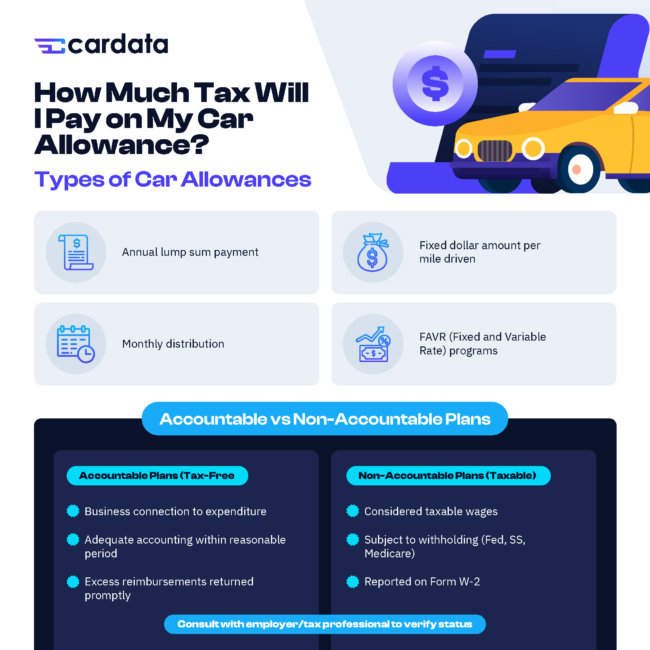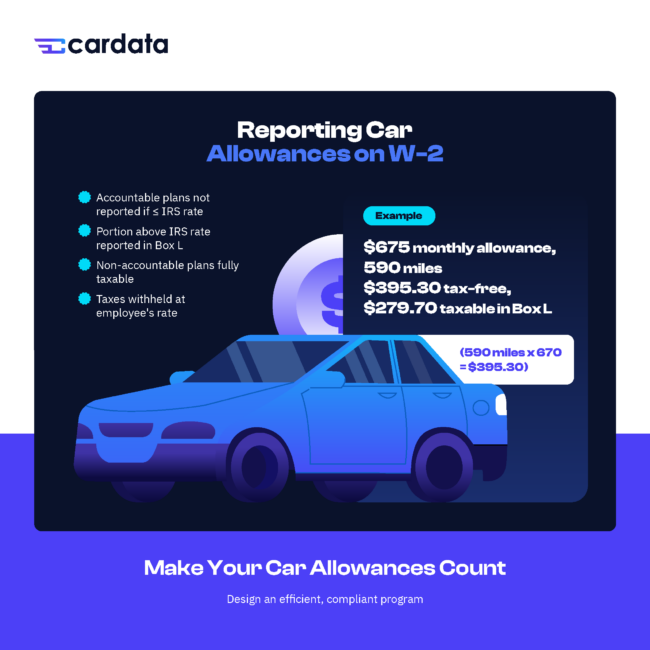Follow us on LinkedIn
Our PageIntroduction
Car allowances provide professionals the freedom to manage their transportation needs without fixating on financial losses. However, the intricacies of tax regulations surrounding these benefits in kind can be perplexing for both employers and employees alike. Fortunately, providers like Cardata have pioneered vehicle reimbursement programs designed to demystify car allowances’ complexities. This article examines the significance of car allowance taxability and how innovative programs offer indispensable savings, so companies can make informed decisions about if and how to adequately reimburse drivers in a manner that is compliant with federal and state laws.

Is a Car Allowance Taxable Income?
While car allowances offer numerous benefits, it is crucial to recognize that, in most cases, they are considered taxable income. Failure to account for the taxable nature of car allowances can lead to unintended financial implications, catching employees and employers off guard during tax season. Employers must ensure that their chosen car allowance plans align with the job requirements and serve a legitimate business purpose. Demonstrating that it is a necessary and reasonable expense incurred is essential for anyone trying to guarantee its position as a non-taxable reimbursement. Conversely, employees must diligently track their car allowance expenses and maintain proper records, providing a robust defense in case of a tax audit. There are, however, more details needed to contextualize these requisites.
When is a Car Allowance Tax-Free?
While car allowances are often considered taxable income, specific Tax-Free Car Allowance options offer a welcome respite for both employers and employees. Accountable car allowance programs consist of a variety of structures, including FAVR and mileage reimbursements that use the IRS rate (65.5 cents in 2023). Nevertheless, these programs are not all created equal, nor is their lack of taxability always guaranteed. Tax-free status is only allotted to those reimbursement programs which meet the guidelines set forth by the Internal Revenue Service (IRS), including but not limited to [2]:
- Direct Relationship to Business Duties: Employers and employees must be vigilant in distinguishing between personal and business use driving, as only the latter qualifies for non-taxable reimbursements.
- Substantiation Requirements: A thorough and well-organized record-keeping approach, including receipts, invoices, and relevant documentation, bolsters the credibility of claimed expenses and shields against potential audits.
- Reasonable and Necessary Expenses: To remain within the bounds of acceptability, the plan must limit reimbursements to reasonable and necessary expenses. The IRS emphasizes prudent frugality, discouraging excess in business-related expenditures.
- Return of Excess Funds: An integral feature of an accountable reimbursement arrangement is the requirement to return any excess funds or allowances to the employer. This practice instills fiscal responsibility and prevents inadvertent windfalls.
- Prohibition of Double-Dipping: Expenses already reimbursed through other means, such as corporate credit cards, must be excluded from consideration.
- Timely Reimbursement: An appropriate reimbursement schedule should not extend beyond a calendar year, promoting efficiency and adherence to fiscal timelines.
[2] 26 CFR § 1.62-2 – Reimbursements and other expense allowance arrangements.
Cost Savings and Tax Efficiency: The Benefits of Tax-Free Car Allowances
For employers, these plans offer the added advantage of reducing payroll taxes; Tax-Free Car Allowance programs translate into significant cost savings. Reduced liabilities begets flexibility – companies can allocate resources strategically, investing in core business activities that foster growth. Additionally, this ensures streamlined expense reporting and eliminates the administrative burden of managing a large mobile workforce, optimizing operational efficiency. Tax-Free Car Allowance programs also contribute to heightened satisfaction and improved employee retention rates.[3] The prospect of tax savings and increased take-home pay fosters a sense of financial well-being and appreciation for the employer’s commitment to their economic interests.
[3] How to Boost Employee Morale and How It Affects Employees | Indeed.com Canada
Tax Waste and Car Allowances
The U.S. national average car allowance for 2023 is currently around approximately $600. With that in mind, IRS compliance can genuinely make or break the efficacy of reimbursements – the repercussions of taxable car allowances on employees and businesses can be staggering, resulting in a substantial amount of tax waste, typically up to 30% of the allowance amount. Indeed, taxable car allowances can inadvertently push employees into higher tax brackets, leading to an even greater tax waste. As the allowance is added to their regular salary, it can cause inflation of their total income, potentially resulting in higher tax rates for other income sources, too. Consider a sales representative who receives a particularly sizable monthly taxable car allowance of $1,000. If the representative falls into a 25% tax bracket because of this additional income, $250 is lost to monthly taxes, culminating in $3,000 of tax waste annually. Similarly, for businesses with multiple employees receiving taxable car allowances, the cumulative tax waste can impact the entire company’s bottom line, impeding growth and financial stability. The financial resources lost to unnecessary taxation could have been allocated to more strategic long-term investments, expansion, or employee development programs – but it’s not too late to prevent this type of excessive and financially destructive structuring of car allowances.

Cardata's Tax-Free Car Allowance Programs
Amidst the complexities of taxable car allowances, Cardata’s roster of innovative vehicle reimbursement programs is a source of hope for those seeking financial prudence. As a tax-free option, Fixed and Variable Rate (FAVR) programs fall under the tax-free umbrella so long as IRS standards are met. Under the FAVR system, employees receive an allowance based on a fixed amount to cover the fixed costs of owning a vehicle, such as insurance and registration fees. Employees are also reimbursed for variable expenses, such as fuel and maintenance, based on costs incurred during business-related travel. FAVR rates are created based on proprietary market info that accounts for regional differences in gas prices. By adopting this approach, employers provide a transparent and tax-free allowance, while employees benefit from accurate reimbursement that aligns with their actual vehicle expenses.
To qualify for a FAVR program, the vehicle in question must be newer than the oldest allowable year, and a minimum of 5,000 business miles must be accrued each year. When new, the cost of the vehicle must be at least 90% of that of the program standard car – this must be true of every employee seeking solace in tax-free reimbursements. Non-compliance is always possible with FAVR; if drivers miss the mark with those rules, their reimbursement will likely be examined for taxable income.
Cardata also offers a more general Tax-Free Car Allowance (TFCA) plan, which is less precise than FAVR, but still very effective, especially if compliance is a touchy subject. Both plans reimburse for the business use of personal vehicles, avoid tax waste, and offer reduced risk compared to using company cars. They differ primarily in requirements and specificity. Whereas FAVR must meet certain minimums for drivers and miles, this is not true of TFCA – it is, plainly and simply, a customizable tax-free program. The program makes things easier, as there is only one compliance measure: you must compare a driver’s reimbursement to the IRS standard rate; only overages are taxed. In other words, it’s perfect for drivers who are not likely to exceed anticipated mileage. However, outsourcing to Cardata makes even FAVR programs easy to run.
By embracing Cardata’s programs, employers can more easily unlock substantial tax savings, reduce payroll taxes, and optimize financial planning. The transparency and accountability inherent in the program eliminate the administrative burden of managing a company fleet, streamlining expense reporting, and enhancing operational efficiency. Furthermore, these vehicle reimbursement programs mitigate the risks associated with taxable car allowances. Ultimately, with the tools of a provider of this caliber, employers can rest assured that their vehicle reimbursement policies align with tax laws, shielding their businesses from potential tax penalties and compliance issues.
Conclusion
We began by delving into the intricacies of car allowances and the specific laundry list of elements needed for IRS compliance. Understanding the taxable nature of traditional car allowances, we emphasized the significance of justifying allowances to avoid tax implications. We then explored the potential tax waste incurred with taxable car allowances, revealing the financial impact on employees and businesses, with up to 30% of the allowance amount lost to taxes. Then, we introduced Cardata’s vehicle reimbursement program as an innovative tax-free alternative that accounts for those guidelines. Next, we unveiled the advantages of Tax-Free Car Allowances, highlighting cost savings, improved tax efficiency, enhanced employee satisfaction, and retention. In navigating the ever-evolving landscape of employee reimbursement, the quest for tax efficiency in car allowances is an instrumental aspect of financial planning and organizational success. In all of those senses, by enlisting in a proper vehicle reimbursement program, companies are embarking on a transformative journey where tax savings, compliance, and economic empowerment converge on a path to success.
Disclaimer: Nothing in this blog post is legal, accounting, or insurance advice. Consult your lawyer, accountant, or insurance agent, and do not rely on the information contained herein for any business or personal financial or legal decision-making. While we strive to be as reliable as possible, we are neither lawyers nor accountants or agents. For several citations of IRS publications on which we base our blog content ideas, please always consult this article: https://www.cardata.co/blog/irs-rules-for-mileage-reimbursements. For Cardata’s terms of service, go here: https://www.cardata.co/terms.
Share on:



